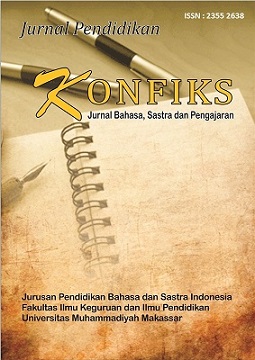CULTURAL REPRESENTATION IN THE POETRY GROUP " THE PEN'S CREATION OF BORNEO" RIFFATERE STUDY
DOI: https://doi.org/10.26618/r00t8y22
Abstrak
The research is a form of attention to the culture of the Tidung tribe which has a significant role as a culture that has distinctive characteristics in Indonesia but is threatened with extinction due to coexistence with transmigration communities and the influence of globalization. This research focuses on the representation of the ethnic culture of the Tidung tribe in the poem "Bucin" Culture and Love by border students in North Kalimantan, namely the introduction, perception, and meaning given by individuals in local context groups. This research uses an analysis of 7 cultural elements in the Tidung tribe through poetry verses. The research method used in this research is descriptive qualitative through the analysis techniques of identification, analysis, and conclusion. Based on the results of the research analysis, it was found that 3 cultural elements (social organizations, livelihoods, local-scale arts, and language in the Bucin poetry collection "Culture and Love" have their own characteristics. Social organizations with an attitude of openness, simplicity, and mutual respect for differences. Livelihoods with the characteristics of producing ironwood/red wood and carvings as a community living on the coast. Art as a characteristic of Tidung culture as a form of conveying the meaning of all forms, objects, and colors used in it. Furthermore, language has characteristics as diction used according to the type of ritual of the Tidung tribe.
Referensi
(Coords.), N. K. D. e Y. S. L. (2012). El campo de la investigacion Cualitativa. SAGE Publication.
Denzin, N. K. (1997). INTERPRETIVE ETHNOGRAPHY Ethnographyc Practices for the 21st Century. SAGE Publication.
Fadlan, M., Saputra, I. T., & Suprianto, S. (2022). PENGUKURAN USABILITY LEVEL WEBSITE E-LEARNING PADA PERGURUAN TINGGI DI KALIMANTAN UTARA. Sebatik, 26(2). https://doi.org/10.46984/sebatik.v26i2.2058
Ilham, M., Aji, D. C., Putri, A., Athira, A., & Putri, C. F. (n.d.). Bucin (Budaya dan Cinta).
Koentjaraningrat. (1985). Pengantar llmu Antropologi. Aksara Baru.
Koentjaraningrat. (2009). Ilmu Antropologi . Rineka Cipta .
Nanang, M. (2008). Sejarah dan Kebudayaan Tidung di Kabupaten Malinau. Sejarah Penyebaran & Kebudayaan Suku-suku di Kabupaten Malinau, 1–28.
Raco, J. R. (2010). Metode Penelitian Kualitatif Jenis, Karaktristik, dan Keunggulannya. Jakarta: Kompas Gramedia. https://doi.org/10.1088/1751-8113/44/8/085201
Siteu, C. P., Simanjuntak, M. R., Ginting, P. V. B., Tarigan, F. A., Sihombing, M. L., Br.Tambun, D., & Simanullang, D. (2023). Mengenal Lebih Dalam Suku Tidung dari Kalimantan Utara Melalui Modul Nusantara. Innovative: Journal of Social Science Research, 3(2), 1–9. https://j-innovative.org/index.php/Innovative/article/view/858
Unduhan
Diterbitkan
Terbitan
Bagian
Lisensi
Hak Cipta (c) 2025 JURNAL KONFIKS

Artikel ini berlisensi Creative Commons Attribution 4.0 International License.
Authors who publish with this journal agree to the following terms:
The author owns the copyright and grants the journal rights for first publication with the work simultaneously licensed under a Creative Commons Attribution License which allows others to share the work with acknowledgment of the work's authorship and initial publication in this journal.
Authors may enter into separate additional contractual agreements for the non-exclusive distribution of the published journal version of the work (for example, posting it to an institutional repository or publishing it in a book), with acknowledgment of its initial publication in this journal.
Authors are permitted and encouraged to post their work online (for example, in institutional repositories or on their websites) before and during the submission process, as this can lead to productive exchanges, as well as earlier and larger citations of published work (See The Effect of Open Access).
Statement of Authenticity and Manuscript Copyright can be downloaded: Here
After filling in the statement letter, please send via e-mail: konfiks@unismuh.ac.id





.png)


